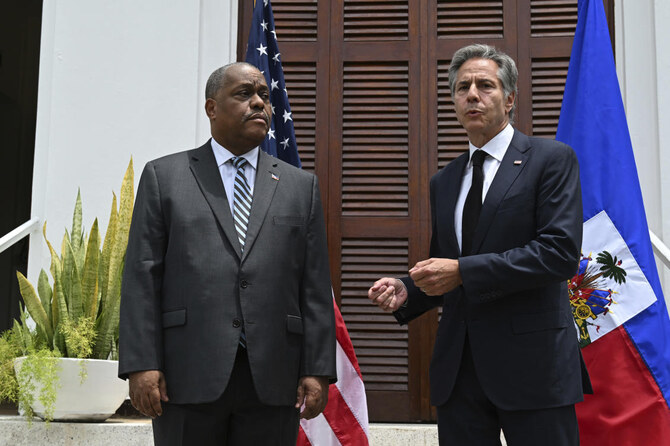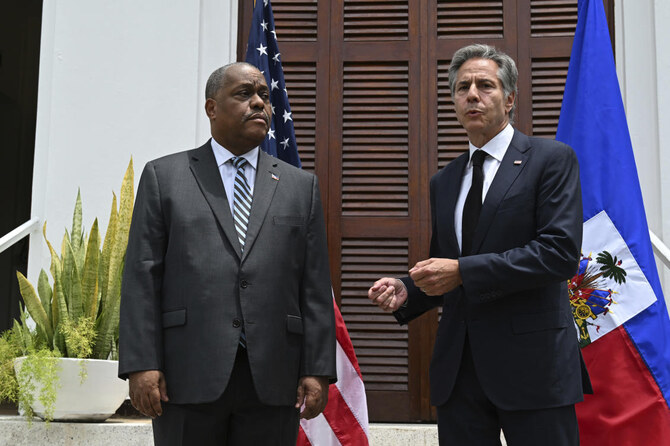PORT-AU-PRINCE, Haiti: US Secretary of State Antony Blinken arrived Thursday in Haiti to reaffirm the US government’s commitment to a multinational mission to fight gangs in the Caribbean country and push for long-awaited general elections.
Some 400 Kenyan police have been deployed to Haiti to lead a UN-backed mission to quell gang violence in the Haitian capital and beyond, but concerns have grown that the mission lacks enough funding and equipment.
Brian Nichols, US assistant secretary for Western Hemisphere affairs, said Wednesday that the US government is considering a UN peacekeeping operation as one way to secure money and resources to fight gangs that control 80 percent of Haiti’s capital.
Blinken arrived a day after Haiti’s government extended a state of emergency to the entire country. It had been imposed earlier in the year in the capital and surrounding areas in an attempt to stem the ongoing violence.
Blinken is scheduled to meet with Haitian Prime Minister Garry Conille and a nine-member transitional presidential council that was created after former Prime Minister Ariel Henry resigned. He also planned to meet with unspecified political party leaders.
Blinken also will meet with the head of the multinational mission and the chief of Haiti’s National Police.
“Our goal is to recognize the positive progress made toward improving security and encourage efforts to appoint the provisional electoral council so Haiti can move toward elections,” Nichols told reporters ahead of the trip.
Haiti last held elections in 2016, and officials since then have blamed gang violence and political upheaval for preventing them from holding new ones.
In July 2021, former President Jovenel Moïse was assassinated, and gang violence since then has surged. In February, gangs launched coordinated attacks on police stations and the main international airport, which remained closed for nearly three months. They also stormed Haiti’s two largest prisons, releasing more than 4,000 inmates.
The violence subsided somewhat before the first contingent of Kenyan police arrived in late June.
“We are seeing a dramatic increase in patrols and operations designed to restore security and sense of normalcy in Haiti,” Nichols said.
However, gangs continue to attack communities surrounding the capital of Port-au-Prince.
After meeting with officials in Haiti, Blinken is scheduled to fly Thursday night to the Dominican Republic, which shares the island of Hispaniola with Haiti.
On Friday, he is scheduled to meet with Dominican President Luis Abinader and other officials before returning to the US later that day.
Nichols said the talks with Abinader will focus on three priorities: strengthening economic ties, advancing values including respect for human and labor rights and promoting increased security in the region, especially in Haiti.
Abinader has come under fire in recent years for his administration’s treatment of Haitian migrants and those born in the Dominican Republic to Haitian parents.
He also has largely closed the airspace with Haiti and is building a wall between the two nations.
Blinken arrives in Haiti to show US support for fighting gang violence
https://arab.news/v64w7
Blinken arrives in Haiti to show US support for fighting gang violence

- Blinken arrived a day after Haiti’s government extended a state of emergency to the entire country
- Blinken is scheduled to meet with Haitian Prime Minister Garry Conille and a nine-member transitional presidential council
Shooter kills 9 at Canadian school and residence

- The shooter was found dead with an apparent self-inflicted gunshot wound
- A total of 27 people were wounded in the shooting, including two with serious injuries
TORONTO: A shooter killed nine people and wounded dozens more at a secondary school and a residence in a remote part of western Canada on Tuesday, authorities said, in one of the deadliest mass shootings in the country’s history.
The suspect, described by police in an initial emergency alert as a “female in a dress with brown hair,” was found dead with an apparent self-inflicted gunshot wound, officials said.
The attack occurred in Tumbler Ridge, British Columbia, a picturesque mountain valley town in the foothills of the Rockies.
A total of 27 people were wounded in the shooting, including two with serious injuries, the Royal Canadian Mounted Police said in a statement.
Prime Minister Mark Carney said he was “devastated” by the “horrific acts of violence” and announced he was suspending plans to travel to the Munich Security Conference on Wednesday, where he had been set to hold talks with allies on transatlantic defense readiness.
Police said an alert was issued about an active shooter at Tumbler Ridge Secondary School on Tuesday afternoon.
As police searched the school, they found six people shot dead. A seventh person with a gunshot wound died en route to hospital.
Separately, police found two more bodies at a residence in the town.
The residence is “believed to be connected to the incident,” police said.
At the school, “an individual believed to be the shooter was also found deceased with what appears to be a self?inflicted injury,” police said.
Police have not yet released any information about the age of the shooter or the victims.
“We are devastated by the loss of life and the profound impact this tragedy has had on families, students, staff, and our entire town,” the municipality of Tumbler Ridge said in a statement.
Tumbler Ridge student Darian Quist told public broadcaster CBC that he was in his mechanics class when there was an announcement that the school was in lockdown.
He said that initially he “didn’t think anything was going on,” but started receiving “disturbing” photos about the carnage.
“It set in what was happening,” Quist said.
He said he stayed in lockdown for more than two hours until police stormed in, ordering everyone to put their hands up before escorting them out of the school.
Trent Ernst, a local journalist and a former substitute teacher at Tumbler Ridge, expressed shock over the shooting at the school, where one of his children has just graduated.
He noted that school shootings have been a rarity occurring every few years in Canada compared with the United States, where they are far more frequent.
“I used to kind of go: ‘Look at Canada, look at who we are.’ But then that one school shooting every 2.5 years happens in your town and things... just go off the rails,” he told AFP.
‘Heartbreak’
While mass shootings are extremely rare in Canada, last April, a vehicle attack that targeted a Filipino cultural festival in Vancouver killed 11 people.
British Columbia Premier David Eby called the latest violence “unimaginable.”
Nina Krieger, British Columbia’s minister of public safety, said it was “one of the worst mass shootings in our province’s and country’s history.”
The Canadian Olympic Committee, whose athletes are competing in the 2026 Winter Games in Italy, said Wednesday it was “heartbroken by the news of the horrific school shooting.”
Ken Floyd, commander of the police’s northern district, said: “This has been an incredibly difficult and emotional day for our community, and we are grateful for the cooperation shown as officers continue their work to advance the investigation.”
Floyd told reporters the shooter was the same suspect police described as “female” in a prior emergency alert to community members, but declined to provide any details on the suspect’s identity.
The police said officers were searching other homes and properties in the community to see if there were additional sites connected to the incident.
Tumbler Ridge, a quiet town with roughly 2,400 residents, is more than 1,100 kilometers (680 miles) north of Vancouver, British Columbia’s largest city.
“There are no words sufficient for the heartbreak our community is experiencing tonight,” the municipality said.














